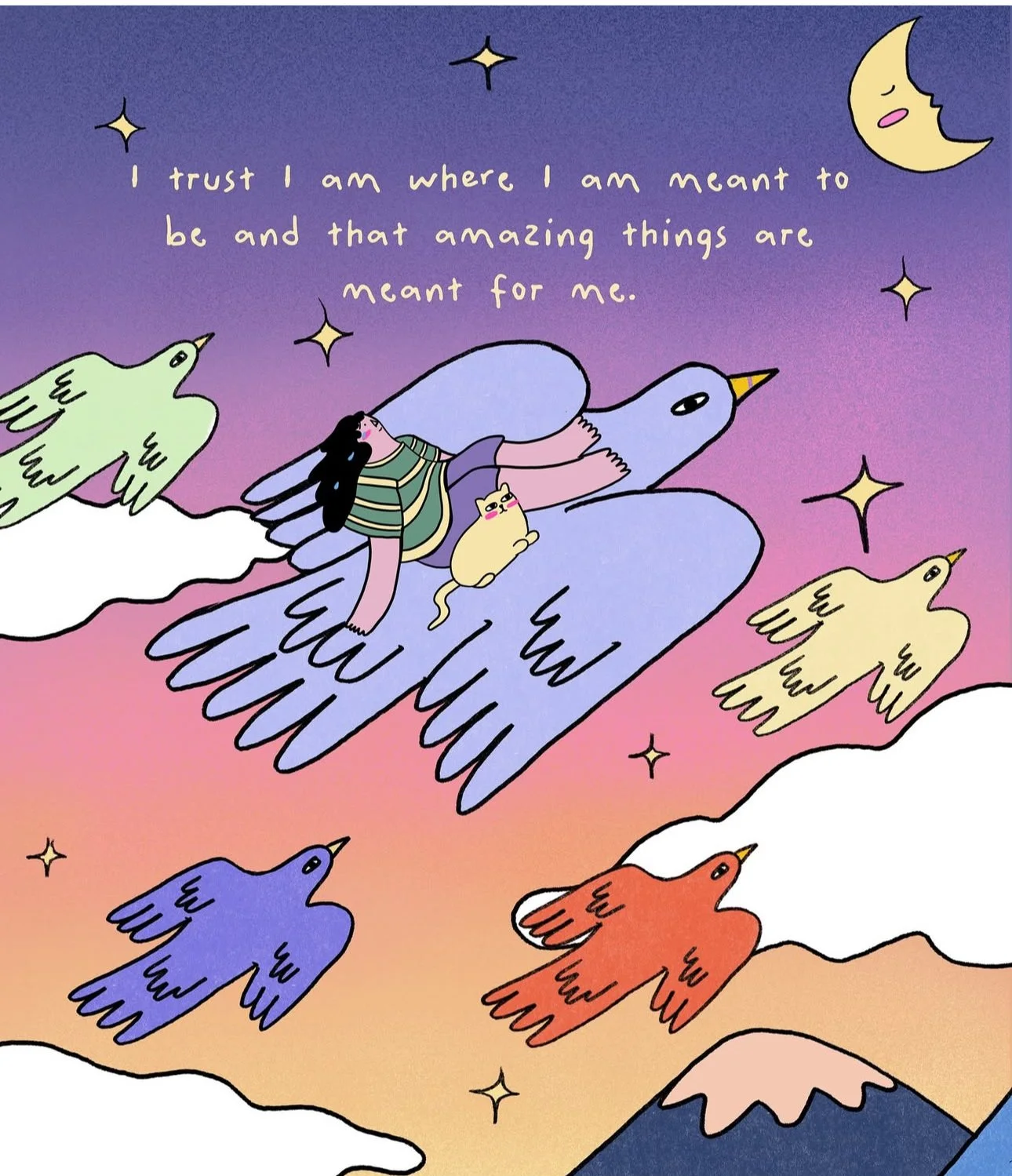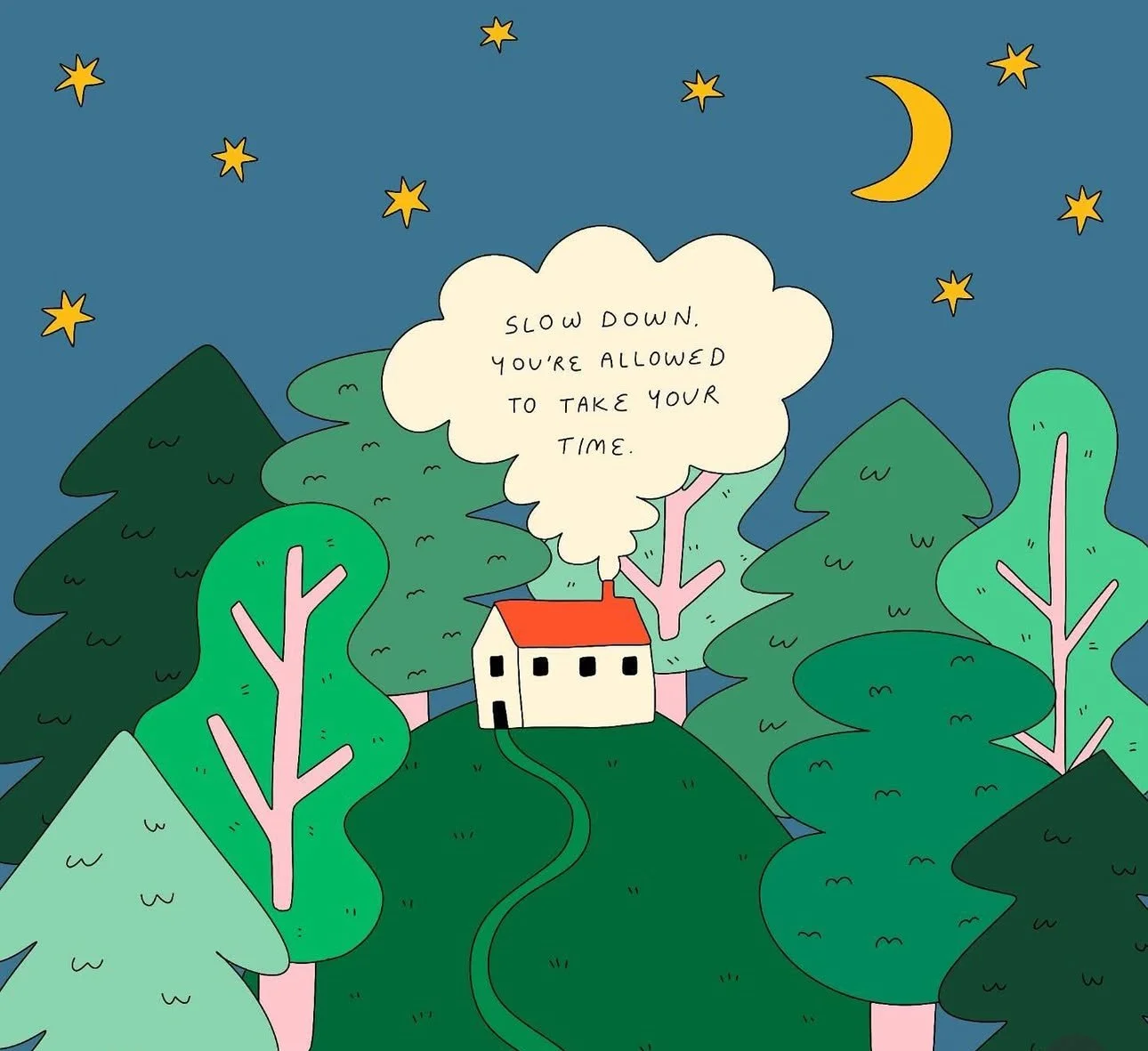Healing is Frustrating: Why Patience (Cliché as it Sounds) is a Secret Ingredient
You’ve done the work. You’ve gone to therapy, read the books, journaled through the messiness, learned to breathe through discomfort. You genuinely believe you’ve done the work, because you have. Your awareness has grown. Your toolbox is equipped. And yet, here it is again: that feeling, that pattern, that loop you thought you’d already moved through.
Illustration By: Lizpop_art
It’s frustrating and disheartening. But it’s also completely normal.
Healing doesn’t move in straight lines. It loops, spirals, and often doubles back. It invites us to meet old wounds with new awareness and that, right there, is the work.
This is the part of healing no one talks about enough: the repetition. The frustration. The part where you wonder if you’ve actually made any progress at all.
Whether it’s emotional eating, doom scrolling, caring too much about what others think, yelling at your kids, or self-sabotaging just when things start going well, it doesn’t mean you’ve failed. It means you’re human.
You’re not just breaking habits. You’re rewiring your brain. And that takes repetition. And repetition takes patience.
It’s easy to feel disappointed in yourself for falling back into an old pattern, especially when you’ve been working so hard to change it. But when those moments happen, pause and ask:
"What would I have done one year ago?"
That’s your proof. The shift is in your awareness.
You’re not back at the beginning. You’re meeting it differently now.
Healing Isn’t Linear (And That’s Not Just a Pretty Quote)
You’ve probably heard the phrase a hundred times. But when you’re in it, really in it ~ it can feel like regression. Like you’re slipping backward instead of progressing.
The truth? You’re not back at the beginning. You’re meeting a past wound with new awareness. And that one difference makes all the difference.
Healing isn’t about erasing anxiety or grief forever. It’s about noticing what’s happening sooner, staying with yourself compassionately, and choosing differently when you’re ready.
There Will be Loneliness
There’s a particular kind of sadness that can come with growth. Not because you’re doing anything wrong, but because you start to notice things you didn’t see before, in yourself and in others. Patterns that once felt familiar now feel heavy. Behaviours that used to pass without a second thought begin to feel misaligned. And the hardest part? You still care deeply about the people who are caught in them.
It can feel lonely when your inner world is shifting and the people you love aren’t ready to meet you there. It takes patience to honour your own growth without rushing to bring others with you. Some relationships will no longer align. Your boundaries might be tested or ignored, again and again, until it becomes clear that you need to let go. And sometimes, the most difficult part isn’t the letting go, it’s accepting that love alone isn’t always enough.
Over time, I’ve learned that we don’t have to rush to bring others with us. We can trust our own rhythm. The people meant to meet us there will catch up when they’re ready, or not, and either way, you stay grounded in your growth, authentic, and true to yourself.
Illustration By: Phoebe Taylor
Patience: The Hardest Tool to Practise
Impatience with yourself can creep in, especially when you’re doing “the work”, showing up, reflecting, trying to shift old patterns. It’s easy to wonder, “Why haven’t I moved past this?”
But healing isn’t something you tick off a list. It’s something you return to again and again, with deeper awareness each time.
Dr. Becky Kennedy says, “The loudest voices in our head aren’t our truest voices; they’re just our most practised voices.” That quote lands every time. The urgent, anxious, self-critical thoughts? They’re not your truth. They’re just familiar. Rehearsed.
This is where patience becomes a radical act. Not passive waiting, but choosing a slower, more compassionate way forward. It’s the decision to say, “I’m not back at the beginning ~ I’m meeting this differently now.”
Just last week, I caught myself spiralling into self-doubt after slipping into an old pattern. And in that moment, I had to remind myself: I’m allowed to revisit the same lesson more than once. The shift was subtle but powerful. I was aware of what I was doing, and I chose differently. That was the learning. That was the healing.
We’re not just shifting habits, we’re rewiring our brains. And that takes repetition. And repetition takes patience. The kind of patience that reminds us: this is working, even if it doesn’t feel like it yet.
The Words You Choose Matter
Over the years, I’ve noticed how much the language we use with ourselves matters. One small shift that’s helped me is replacing “I have to” with “I choose to.” It removes the pressure and gives me back my agency.
Aside from sleeping, eating, and hydrating, we’re choosing everything else, including how we show up for ourselves.
“I choose to pause for five breaths.”
“I choose to log off by 3 p.m. and be at school pick-up.”
“I choose to rest even if the dishes wait until morning.”
Softer language creates space for softer choices. It makes room for self-respect, even when things feel messy or undone.
How to Go Lighter on Yourself
If you’re in a season where your progress feels invisible, try this:
Name it, without shame. “This is a hard moment, not a failure.”
Track the shifts. What would the past you have done here? That’s your proof.
Let yourself circle back. Relearning isn’t regression—it’s reinforcement.
Take breaks from fixing. Sometimes what you need isn’t another insight ~ it’s rest.
Stay in your lane. Your growth doesn’t need to match anyone else’s timeline.
You’re Still Moving
There’s a sacred kind of progress that doesn’t look like forward motion. It looks like deeper awareness. Gentler decisions. A steadier nervous system.
You might not see the change in the mirror, but it’s taking shape in the way you move through the world.
And that is healing.
With heart,
Anika 🫶🏽
Illustration By: @anikabull_therapy



